|
|
| 'Like' us on Facebook | Follow us: |
Posted on: May 14, 2014
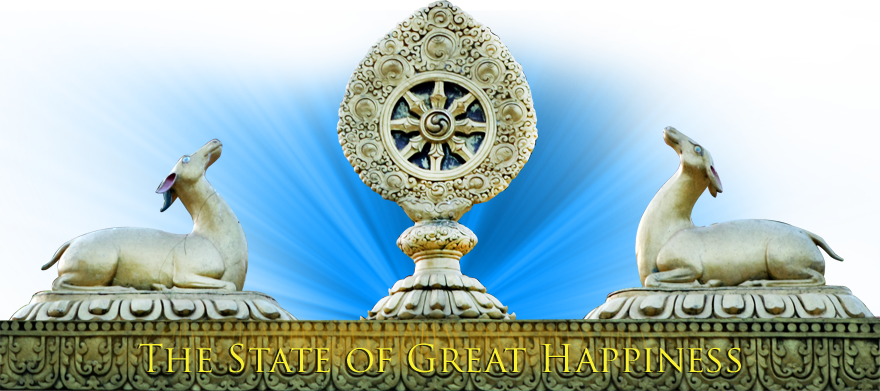 |
On a number of occasions in the course of His discourse Bhagawan Baba would assert a statement such as 'Happiness is union with God' and then go on to narrate a story or an anecdote to illustrate this. This message and this style were not new to the Sathya Sai Avatar. In fact every time God descended on earth to deliver a message to mankind, he captured the minds of the people with powerful and profound parables and tales, stories and legends. Be it Jesus, Mohammad, Guru Nanak, The Sai Avatars or The Buddha, each incarnation used insightful instances to instil the timeless principles of Love and Sacrifice, Truth and Righteousness in the hearts of their followers. Therefore like we have Chinna Kathas for the Sathya Sai Avatar and Parables of Jesus, there are Jataka Tales associated with The Buddha.
The term Jataka is a technical name in Buddhist literature for a story purporting to tell one or other of the previous births of Gautama Buddha before He attained final enlightenment. The broad human appeal of these stories is because the Bodhisattva (or Buddha-to-be) appears sometimes as the hero of the stories, sometimes as a character in them and sometimes as a commentator on the action, but invariably in recognisable and often in very human situations and contexts with which readers can identify. In addition, being stories believed to be related by the Buddha about His own previous incarnations as a Bodhisattva, they are also seen as part of the continuing Buddha story.
Over the centuries, the Jataka stories have been constantly referred to and discussed in sermons by Buddhist monks, used as images and illustrations in literary works, depicted in paintings and sculpture by artists. Thus they have seeped deep into people's imaginations and become a part of the vocabulary and culture of especially those areas where Buddhism is widely prevalent. So here is one such Jataka story adapted from “The Reverend Book of Five Hundred and Fifty Jataka Stories, Volume – I”.
As we celebrate Buddha Poornima this year, let us spare a few minutes to not only read but also ruminate on the message conveyed through this tale narrated by the Divine. One thing for sure will happen if we do this – we will learn to be in happiness always.
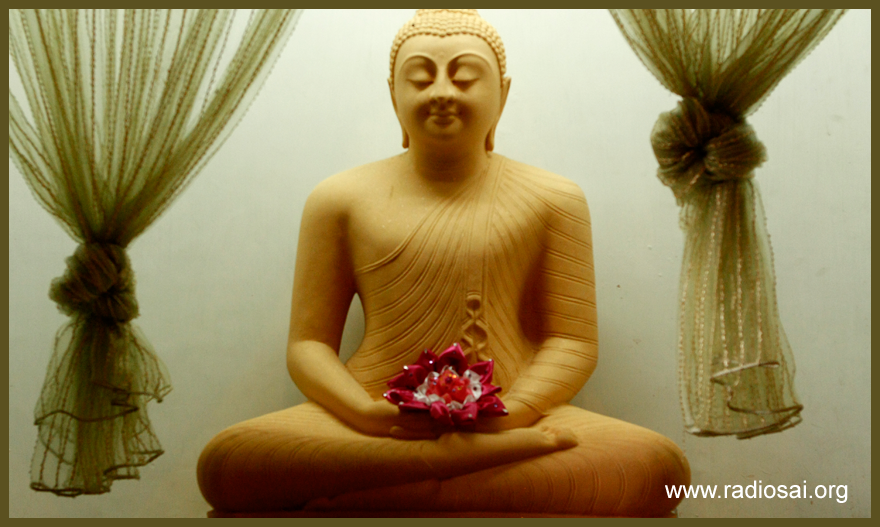 |
Once the All-knowing Buddha related this story about the monk Bhaddiya who enjoyed great happiness. Bhaddiya was ordained along with six princes of the kshatriya (warrior) clan.
Earlier when Bhaddiya was a king, he used to protect himself well with guards. Even when he was on the upper floor of his securely guarded palace, he would toss about in his bed overcome with fear. His joy after becoming an arahat (a monk who has attained enlightenment) was immense, as he no longer had that fear, and could roam about in forests and deserted places. So overjoyed was he that he burst into joyful exclamations “O happiness! O happiness!”
The monks, hearing him, informed the Buddha that the monk Bhaddiya was so happy and relieved at this freedom from fear that he continuously exclaims about the happiness he had achieved.
The Buddha said, “O monks, it is not only in the present that the monk Bhaddiya has achieved such happiness. His life was no less happy in the past.”
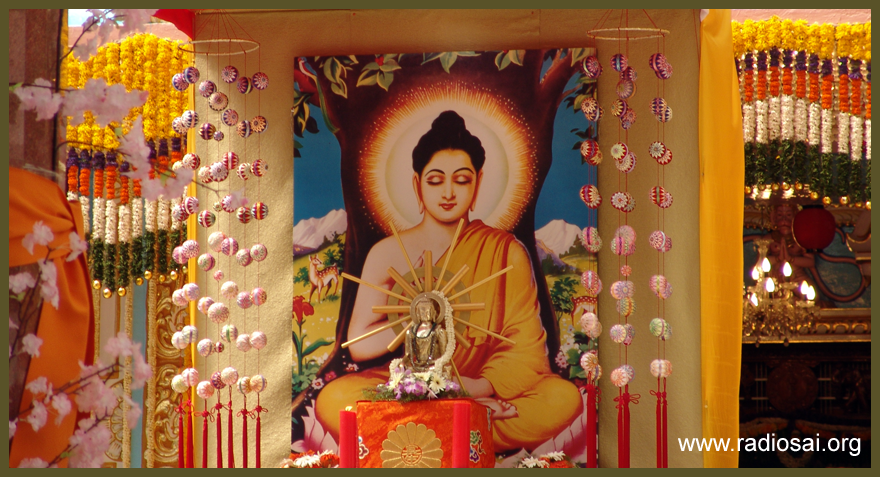 |
The monks requested a fuller explanation from the Buddha who then related this story to make clear what the human condition of rebirth had concealed from them.
Long ago when a king named Brahmadatta ruled in the city of Baranas, the Bodhisattva (The Buddha in a former life) was born into the family of a wealthy Brahmin. When he realised the evils of lust and depraved living, and the blessings that he could gain from renouncing the material life, he gave up his lustful life and retired to the Himalayan forests. There he lived the life of an ascetic and attained the Eight Meditative Attainments (atta sampati).
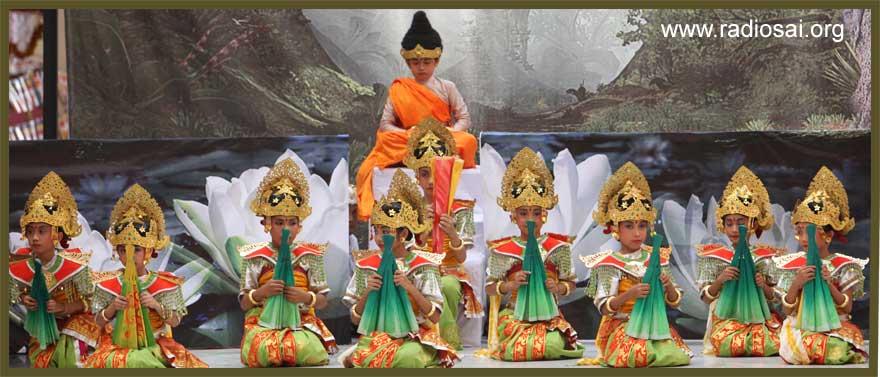 |
He had a large following of five hundred ascetics. When the rains set in, he left the Himalayan forest and travelled with his attendants through villages and towns and came to the city of Baranas. Here he lived in the royal pleasure grounds enjoying the generosity of the king. He lived there during the four months of the rains and then informed the king of his impending departure.
When the king heard this he said, “You are old, Reverend Sir. What is the use of your going back to the Himalayas? Send your attendants there and continue to stay here.”
The Bodhisattva then entrusted his five hundred disciples to the care of the most senior among them and said, “Go with these ascetics to the Himalayas.” He stayed back in the royal garden.
The oldest disciple had once been a king and had given up a powerful kingdom to be ordained. After he had mastered the powers of concentration, he achieved the Eight Trance States. While he was living in the Himalayas with the ascetics, after a while he felt a desire to see the Master. He said to the followers, “Stay here contentedly. I will be back as soon as I have paid my respects to the Master.”
He went to the Master, paid his respects, spoke pleasantly to him and remained respectfully seated on a side.
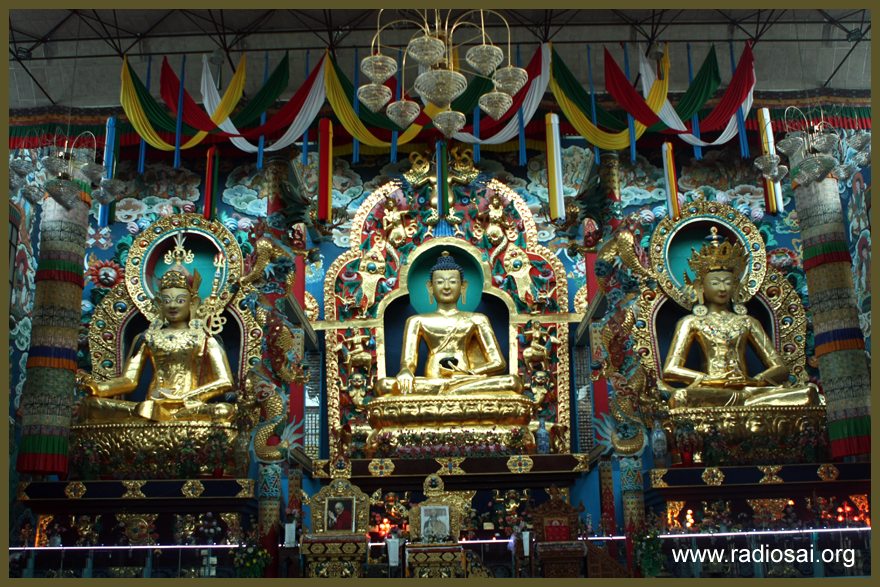 |
At this time the king of Baranas, came to the pleasure gardens to see the Bodhisattva. He worshipped him and sat on a side. Though the attendant monk was aware of the king's presence he did not rise. He continued to sit there exclaiming his joy “O happiness! O happiness!”
The king was not pleased that the monk had not risen in his presence. He said to the Bodhisattva, “Sir, this ascetic must have had his fill of food that he continues to sit there proclaiming his happiness so earnestly.”
“Your majesty, this old ascetic was once a king just as you are today. He is thinking, 'When I was formerly a laymen I enjoyed royal pleasures and was protected by large number of armed guards, but never have I enjoyed happiness such as this.' It is his present happiness, living the life of an ascetic, the happiness that he has gained through meditation and attaining the bliss of Trance States, that make him utter these cries of joy. Thus exchanging his material pleasures for the Trance States he now makes these exclamations of joy.”
The Bodhisattva then preached the following sermon:
“O king, even if a man is not protected by many men or guarded by many creatures, if that man has no expectations of wealth and is free of lustful desires, free in mind and body, then, even if he were to live alone, such a man sleeps well. He does not merely sleep well, such a man is happy when he walks, happy when he sits, happy when he stands, in fact is happy in every movement.
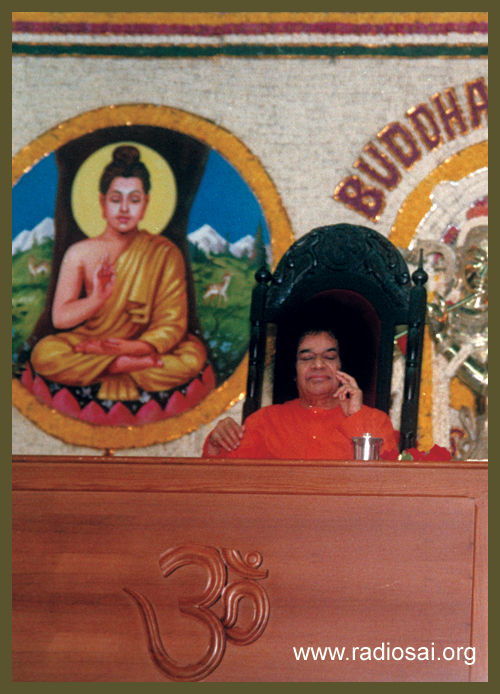 |
“O Great king, a man free of desires, lives happily. It is the happiness that such insight brings that moves this ascetic to make these heartfelt utterances.”
The Buddha, the Great Master, narrated these events and at the end of his sermon, linked the story of the past with the present and concluded thus:
“The attendant ascetic at that time is now the Senior Monk Bhaddiya. The master was me, the Supreme Buddha, Teacher of the Three worlds.”
In a discourse on February 12, 1989, Baba said, “There are two categories of happiness in the world: Acquired Happiness and Self-generating Bliss. Acquired happiness is associated with sensory objects; it arises and vanishes according to circumstances. This applies to everyone in the world; what is experienced when things are enjoyed is evanescent. So this type of joy has been described as Acquired or Derived Happiness. As it is got and lost by human effort, it is not true bliss.
“Man, however, seeks lasting bliss (Ananda). In truth he is the embodiment of bliss and is filled with bliss. Bliss constitutes his very nature and being. It exists of itself in him, so why does he not experience it? Being unaware of his true nature, he is obsessed with the external world and fails to experience the bliss within him.”
Elaborating on this on February 1, 2001, Baba said:
“Bliss is within you; it emanates from your sacred feelings. So you have to manifest bliss from within; it cannot be bestowed on you by others. No one can take the bliss away from you, and you cannot obtain it from outside.
"With purity of heart, steadiness of mind and selfless actions, one can earn divine grace which can remove any amount of suffering in a trice. Without divine grace, one cannot achieve anything, therefore one must undertake activities that will earn that grace. Peace and happiness cannot be obtained from the external world. Only divine grace can bring you true happiness.”
Time and again through so many of His incarnations, Baba is reminding us of the same principle - All happiness is within and not without. All that is within is eternal while all that is without is ephemeral.l. So let us make the right choice and revel in Bliss Divine!
- Radio Sai Team
What do you think about this article? Please let us know by writing to h2h@radiosai.org. Do not forget to mention your name and country.






